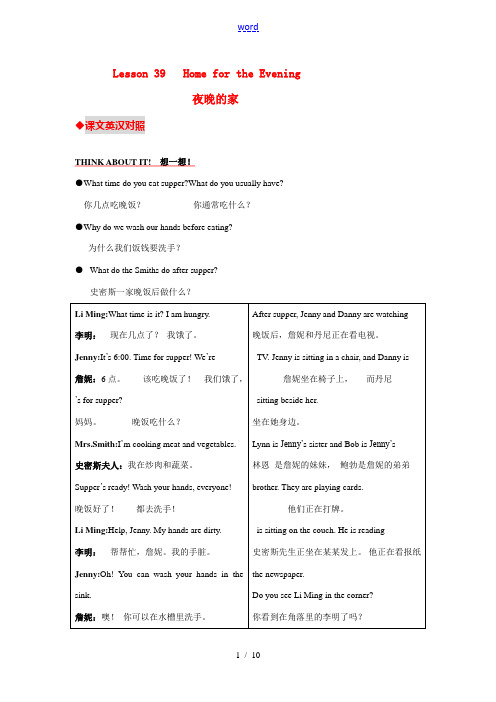lesson39
- 格式:ppt
- 大小:3.48 MB
- 文档页数:24




Lesson 39 Nothing to worry about不必担心The rough road across the plain soon became so bad that we tried to get Bruce to drive back to the village we had come from. Even though the road was littered with boulders and pitted with holes, Bruce was not in the least perturbed. Glancing at his map, he informed us that the next village was a mere twenty miles away. It was not that Bruce always underestimated difficulties. He simply had no sense of danger at all. No matter what the conditions were, he believed that a car should be driven as fast as it could possibly go.As we bumped over the dusty track, we swerved to avoid large boulders: The wheels scooped up stones which hammered ominously under the car. We felt sure that sooner or later a stone would rip a hole in our petrol tank or damage the engine. Because of this, we kept looking back, wondering if we were leaving a trail of oil and petrol behind us.What a relief it was when the boulders suddenly disappeared, giving way to a stretch of plain where the only obstacles were clumps of bushes. But there was worse to come. Just ahead of us there was a huge fissure. In response to renewed pleadings, Bruce stopped. Though we all got out to examine the fissure, he remained in the car. We informed him that the fissure extended for fifty yards and was two feet wide and four feet deep. Even this had no effect. Bruce went into a low gear and drove at aterrifying speed, keeping the front wheels astride the crack as he followed its zigzag course. Before we had time to worry about what might happen, we were back on the plain again. Bruce consulted the map once more and told us that the village was now only fifteen miles away. Our next obstacle was a shallow pool of water about half a mile across. Bruce charged at it, but in the middle, the car came to a grinding halt. A yellow light on the dash-board flashed angrily and Bruce cheerfully announced that there was no oil in the engine!New Words and Expressions 生词和短语rough (1. 1) /rʌf/adj. 崎岖不平的boulder (1. 3) /'bəuldə/ n. 大石块pit (1. 3) /pit/ v. 使得坑坑洼洼perturb (1. 4) /pə'tə:b/ v. 使不安underestimate (1. 6) /'ʌndər'estimeit/ v. 低估swerve (1. 9) /'swə:v/v. 争转变scoop (1. 9) /sku:p/ v. 挖出hammer (1. 10) /'hæmə/ v. (用锤)击打,锤打ominously (1. 10) /'ɔminəsli/ adv. 有预兆的,不祥的rip (1. 10) /rip/ v. 划破,撕,扯petrol (1. 11) /'petrəl/ n. 汽油stretch (1. 13) /stretʃ/ n. 一大片(平地或水)obstacle (1. 14) /'ɔbstəkəl/ n. 障碍clump (1. 14) /klʌmp/ n. 丛,簇fissure(1. 15)/'fiʃə/n. (石,地的)深缝renew (1. 15) /ri'nju:/ v. 重复pleading (1. 15) /pli:diŋ/ n. 恳求gear (1. 17) /giə/ n. (汽车) 排档astride (1. 18) /ə'straid/ prep. 骑,跨crack (1. 18) /kræk/ n. 缝隙zigzag (1. 18) /'zigzæg/n. “之”字形halt (1. 21) /hɔ:lt/n. 停shallow (1. 20) /'ʃæləu/ adj. 浅的dashboard (11. 21-22) /'dæʃbɔ:d/n. (汽车上的)仪表盘grind (1. 21) /graind/ (ground/graund/, ground) v. 磨擦Notes on the text 课文注释1 get sb. to do sth. ,说服某人做某事。

Lesson 39 Danny’s Report教学目标通过本课的学习,学生能够:1.熟练掌握《英语课程标准》要求的“四会”词汇及重点句型。
2.阅读文本,学会运用一般过去时介绍运动。
3.就本话题用英语表达自己的思想和观点,有效地和他人进行语言交流。
4. 热爱运动,积极参与体育锻炼。
语篇研读What: 本课语篇是一篇记叙文,作者从Danny的角度使用一般过去时介绍了一次成功的运动会。
分别介绍了运动会的比赛项目,部分项目的获胜者,以及Danny参赛的项目,Danny赛跑比赛得第三名的原因。
Why: 作者从Danny的角度介绍了一次成功的运动会,让学生认识到运动可以保持健康,鼓励学生热爱运动,积极参与体育锻炼。
How: 语篇采用分段讲述的形式,结构清晰。
第一段讲述运动会的比赛项目和参赛人员;第二段讲述一些项目的获胜者;第三段讲述Danny参加赛跑并取得第三名后,同学们对他的鼓励;同时,升华主题——参赛不重要,重要的是锻炼身体,开心快乐。
教学过程设计理念:以《英语课程标准》核心素养为导向,以单元主题为引领,基于语篇的育人理念,体现《英语课程标准》“学思用创”的英语学习活动观和“教—学—评”一体化设计理念。
续表续表达到巩固知识的目的class.2. Do the multiple choices.(见PPT) 情况给出必要的指导和反馈设计意图通过练习,对学生当堂课所学的内容进行过程性评价,达到“教—学—评”一体的学习效果【应用实践】Activity 8: Group work通过小组讨论,灵活运用本课知识,完成小语篇写作Work in groups. Talk about thelast sports meet at your school.How many events were there?Who took part in the events? Whowere the winners? Did you havefun?Write a short passage about it.观察学生是否能完成练习任务,根据学生情况给出必要的指导和反馈设计意图通过小组合作讨论,学生口头输出有关运动会话题的语言,既完成了本课语言目标任务,又练习了语法【迁移创新】板书设计Lesson 39 Danny’s Report作业设计基础型作业:Review and recite the important points of this lesson. 实践型作业:Ask the students to talk about the sports day.教学反思。

Lesson 39 Home for the Evening夜晚的家◆课文英汉对照THINK ABOUT IT! 想一想!●What time do you eat supper?What do you usually have?你几点吃晚饭?你通常吃什么?●Why do we wash our hands before eating?为什么我们饭钱要洗手?●What do the Smiths do after supper?史密斯一家晚饭后做什么?Li Ming:What time is it? I am hungry.李明:现在几点了?我饿了。
Jenny:It’s 6:00. Time for supper! We’re詹妮:6点。
该吃晚饭了!我们饿了,’s for supper?妈妈。
晚饭吃什么?Mrs.Smith:I’m cooking meat and vegetables. 史密斯夫人:我在炒肉和蔬菜。
Supper’s ready! Wash your hands, everyone!晚饭好了!都去洗手!Li Ming:Help, Jenny. My hands are dirty.李明:帮帮忙,詹妮。
我的手脏。
Jenny:Oh! You can wash your hands in the sink.詹妮:噢!你可以在水槽里洗手。
After supper, Jenny and Danny are watching晚饭后,詹妮和丹尼正在看电视。
TV. Jenny is sitting in a chair, and Danny is 詹妮坐在椅子上,而丹尼sitting beside her.坐在她身边。
Lynn is Jenny’s sister and Bob is Jenny’s林恩是詹妮的妹妹,鲍勃是詹妮的弟弟brother. They are playing cards.他们正在打牌。





新概念1lesson39课文摘要:一、课文概述二、课文解析1.词汇解析2.句子解析3.语法解析三、课后练习四、学习建议正文:一、课文概述新概念英语Lesson 39的课文主题为“A tiring day”,讲述了一位疲惫的教师在一天的辛苦工作后,回到家中休息、放松的经历。
课文通过生动的描绘,展示了教师在日常工作中付出的辛勤努力以及回家后的愉悦心情。
二、课文解析1.词汇解析(1)tiring:累人的,令人疲惫的(2)spring:春天(3)teach:教授,教学(4)school:学校(5)come home:回家(6)foot:脚(7)tramp:漫步,散步(8)weary:疲惫的(9)sink:下沉,陷入(10)bath:洗澡2.句子解析(1)The teacher was very tired.她非常疲惫。
(2)She came home and took off her shoes.她回到家,脱下了鞋子。
(3)She put her feet into the warm water.她把脚放入温暖的水中。
(4)She felt better after a bath.洗澡后她感觉好多了。
3.语法解析本课文的语法重点为一般过去时态的运用。
在描述教师一天的经历时,作者使用了过去时态来展示事件的先后顺序。
三、课后练习1.根据课文内容,回答以下问题:(1)Why was the teacher tired?(2)What did she do when she came home?(3)How did she feel after taking a bath?2.翻译句子:(1)她非常疲惫。
(2)她回到家,脱下了鞋子。
(3)她把脚放入温暖的水中。
四、学习建议1.熟记课文中的重点词汇和语法知识,加强基本功。
2.通过课文,了解教师的工作辛勤和回家后的放松心情,学会关心和理解他人。





Lesson 39~ 40重点单词:1)front n 前面反义词:back 2)in front of 在什么..之前(在外面)in the front of 在什么...之前(在里面)3)careful adj care 名词词组:take care of 照顾4)drop v 掉下drop down drop out (俚语:辍学)drop n 水滴rain drops 雨滴5)show v 给...看show sb sth (展示某人某物)Show sth to sb show me your book (给我看你的书)=show your book to me show off (炫耀,卖弄)I love to show off my phono 我喜欢炫耀我的照片6)take v 带给反义:bring 带来take off 起飞,脱下The plane will take off at 9 clock.take away 带走takeaway 外卖bring back 带回来take over 接管take up 拿起,占据(时间)7)send v 发送,邮寄;派遣;发射Send sth to sb 邮寄某物给某人= send sb sthSender n 邮寄人;发送人;1)front n 前面反义词:backPlease stand at the front of the line.The car in front of us stopped suddenly.2)in front of 在什么..之前(在外面)in the front of 在什么...之前(在里面)The dog sat in front of the fireplace.The store is located in the front of the building.3)careful adj care 名词Be careful when you cross the street.She took care of her younger brother.4)drop v 掉下drop down drop out (俚语:辍学)drop n 水滴He dropped his pen on the floor.Raindrops fell from the sky.5)show v 给...看Can you show me your new painting?She showed the map to her friend.6)take v 带给I will take the documents to the office.Please take this message to Mr. Smith.7)send v 发送,邮寄;派遣;发射I will send you an email with the information.They sent a package to their grandparents.◆语法讲解一般将来时(Simple Future Tense)用于表示将来发生的动作、事件或状态。

